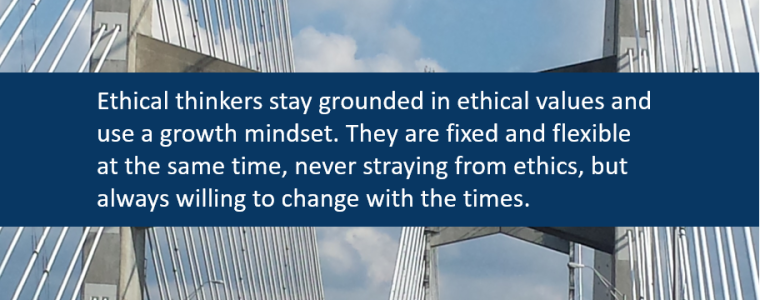By Linda Fisher Thornton Graduates, as you start to search for a job, I want to share some guidance about how to choose an organization that aligns with your values to enhance your work experience and likelihood of success.
Category: Complexity
What Role Does Exclusion Play in Hate and Violence? (Part 3)
By Linda Fisher Thornton One of the thinking traps that people fall into is putting people into categories. This may result in assigning a derogatory label to the category, and making blanket statements about how "all people" from that category are a certain way.
What Role Does Exclusion Play in Hate and Violence? Part 2
By Linda Fisher Thornton Moral exclusion includes using an insider mindset and thinking that others (who are not members of the group) as not worthy of protecting. If you're not yet familiar with moral exclusion, this post may be helpful background on differences in world views and selective inclusion.
What Role Does Exclusion Play in Hate and Violence? Part 1
By Linda Fisher Thornton Hate speech and violence do not adhere to ethical values. An ethical person will quickly rule them out due to the harm they cause to others. But even when someone wants to be an ethical person, there are problems with human thinking that can enable hate and violence to happen.
How to Tell What’s “Right” in a Complex Situation
By Linda Fisher Thornton To understand a complex situation, you first have to WANT to see it as it really is. This means letting go of preconceived ideas of what might be true, and being open to what may unfold as you learn more. After approaching the situation with this open mindset, you need to get more information. As you know from completing puzzles with lots of pieces, a few pieces do not show you the whole picture. As you complete a jigsaw puzzle, you start to see parts of the picture and begin to get a sense of it, but you're definitely still not seeing it as it really is.
Ethical Thinking and Decision Making for Leaders (Part 6)
By Linda Fisher Thornton This series has explored 5 important leadership spheres of Ethical Thinking and Decision Making. This week I’m summing it up in a checklist that will help you apply all 5 to your daily choices. When you are making a key decision, run it through the checklist to be sure you have considered all 5 important dimensions.
Ethical Thinking and Decision Making for Leaders (Part 5)
By Linda Fisher Thornton While change is a constant reality, it doesn’t always factor into leadership thinking. In Part 1 and Part 2 of this series, I explored the Depth of our thinking, and the importance of understanding Context. In Part 3 and Part 4, I looked at embracing Complexity and the importance of full Inclusion. In Part 5, I’ll describe how embracing Change helps us make ethical decisions.
Ethical Thinking and Decision Making for Leaders (Part 4)
By Linda Fisher Thornton Who we include in our ethical thinking, and how broadly we consider our responsibility to others are both important elements of ethical leadership. In Part 1 of this series, I explored the Depth of our thinking, and in Part 2, I broke down issues related to understanding Context. In Part 3, I looked at embracing Complexity. In Part 4, we’ll dig into the importance of Inclusion.
Ethical Thinking and Decision Making for Leaders (Part 3)
By Linda Fisher Thornton Ethical Thinking and Decision Making require staying grounded in ethical values, but there is much more to do than knowing our values and living them every day through our choices. In Part 1 of this series, I explored the Depth of our thinking, and in Part 2, I broke down issues related to understanding Context. In Part 3, let’s take a look at Complexity.
Ethical Thinking and Decision Making for Leaders (Part 2)
By Linda Fisher Thornton In Part 1 of this series I looked at the importance of Deep Thinking. In Part 2, we’ll consider the Context. No matter how much effort it takes to understand the context, we can’t expect to make an ethical decision without taking that step.
Ethical Thinking and Decision Making for Leaders (Part 1)
By Linda Fisher Thornton Welcome to Part 1 in the series “Ethical Thinking and Decision Making for Leaders.” Welcome to Part 1 in the series “Ethical Thinking and Decision Making for Leaders.” Ethical decision-making is not simply a task. It is the process of analyzing and understanding multiple connected variables in a changing context AND applying ethical values to make responsible choices. It requires doing the work to understand issues clearly before making decisions or taking action. In each post in this series, I’ll explore one aspect of this complex, connected process. Today I’ll focus on the importance of deep thinking.
Why Making Money Doesn’t Ensure Business Success
By Linda Fisher Thornton Ask for profitability and your company may get it, at the expense of customer satisfaction, employee engagement, and product safety. Making profitability a top business goal without balancing that with adequate ethics awareness is extremely risky, and could lead to community backlash that ends up destroying your brand.
Ethical Perspectives: Rights, Responsibilities, and Freedom
By Linda Fisher Thornton While some people think of rights, responsibilities and freedom separately, in a compartmentalized way, I believe they cannot be separated, and according to John Courtney Murray, freedom was always intended to be grounded in ethical values.
Making Ethics Clear
By Linda Fisher Thornton Workplace issues are complex and opinions vary about the right thing to do in challenging situations. This complexity and uncertainty combine to create a "murky uncertainty" that may keep people from giving us their best, most ethical performance. Leaders may intend to create an ethical culture, but may still have difficulty getting past the murky uncertainty about what ethics means. To move beyond the uncertainty, we need to take the time to talk about ethical behavior and how we will make ethical decisions.
Systems Thinking: The Diet Soda Puzzle
By Linda Fisher Thornton Research is showing that diet sodas do not help prevent weight loss, and in fact may be a cause of weight gain. How can this be? Since the way we understand it depends on which kind of thinking we use, let's examine the issue using several different kinds of thinking.













